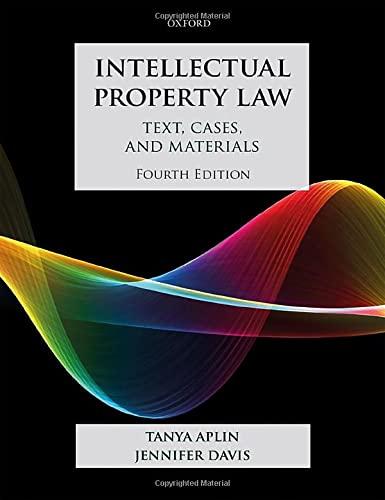Question
Could you please help me understand the answer to these questions? Following the passage of a new stand your ground law that expanded the circumstances
Could you please help me understand the answer to these questions?
Following the passage of a new "stand your ground law" that expanded the circumstances in which citizens could use lethal force to protect their lives and property, the number of citizens claiming the privilege of self-defense increased substantially, as did the number of homicides.
Concerned, the State of Grace legislature decided to modify its laws on self-defense. The law previously required the State to disprove all self-defense claims as part of any prosecution for intentional homicide (which has as its elements "intentionally causing the death of another"). The law now states that any defendant claiming the privilege of self-defense must also bear the burden of proving by clear and convincing evidence that he or she killed in self-defense.
Is this change Constitutional underMullaneyandPatterson?
Group of answer choices
a.Yes, because the law does not shift the burden of persuasion or production on any element of the crime.
b.No, because it impermissibly places a burden of persuasion on the defendant.
c.Yes, because the legislature did not require defendants to prove self defense beyond a reasonable doubt.
d. No, because the burden shift is inconsistent with the expansion of the self-defense law passed earlier by the legislature.
Question 4
The State of Grace passes a new statute that makes it a crime for a person to intentionally cause bodily harm to another. The statute includes an affirmative defense that absolves a defendant from any criminal liability if he or she proves by a preponderance of the evidence that the harm was caused accidentally.
Is this statute constitutional underMullaneyandPatterson?
a. No, because it makes the defendant bear a burden of production on the affirmative defense.
b. No, because it requires the defendant to disprove an element of the substantive crime.
c. Yes, because punishment can only be imposed if the substantive crime is proven.
d. Yes, because it requires the state to prove also elements of the substantive crime beyond a reaosnable doubt.
Step by Step Solution
There are 3 Steps involved in it
Step: 1

Get Instant Access to Expert-Tailored Solutions
See step-by-step solutions with expert insights and AI powered tools for academic success
Step: 2

Step: 3

Ace Your Homework with AI
Get the answers you need in no time with our AI-driven, step-by-step assistance
Get Started


